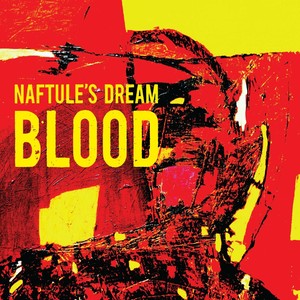
- 歌曲
- 时长
简介
Naftule’s Dream, whose seminal recordings in the 1990’s helped create the Radical Jewish Culture movement and jumpstart John Zorn’s Tzadik label, has released its first new recording since 2002, Blood (NDR 103). The band known for its eclectic, edgy approach to Jewish music, once again produces a memorable album of musical explorations, penning klezmer-rooted compositions with performances which draw on rock, free-jazz and even ambient music for inspiration. Naftule’s Dream was founded by clarinetist/composer Glenn Dickson as an offshoot of his traditional klezmer band, Shirim, to give voice to more adventurous musical ideas. It quickly exploded, as the musical creativity of the musicians was unleashed in extraordinary compositions by Dickson and accordionist Michael McLaughlin. Their original works, though rooted in klezmer rhythms, modes and forms, draw from a wide pallet of styles. Over the years the band has evolved into a unique, uncategorizable, challenging-yet-entertaining troupe that has played new-music venues, major international jazz festivals (Montreal, Berlin, Graz, New York) and concerts across Europe and the US. Blood, like its predecessors, is powered by the unique tuba-driven rhythm section, featuring founding members Eric Rosenthal (drums) and Jim Gray (tuba) and McLaughlin (accordion). New to the mix is Boston-based guitarist Andrew Stern. The melodic duties are shared by Dickson (clarinet) and cornetist Gary Bohan, who began touring with Naftule's Dream in the early 2000s, but has not previously recorded with the band. The album opens with the spacious, almost ambient, McLaughlin composition, "Sitting in Some Train Watching the Tuscan landscape Go Speeding Backward," which sets the tone for a deeply introspective album which mines the meditative eastern elements of klezmer music as well as the more celebrated exuberant energy of klezmer music. It evokes a Romanian style doina with a soaring melody over a hypnotic rhythm, with Rosenthal's cymbal pattern filling in for the insistent cymbalom groove . The title track follows, a dark but unforgettable melody which beautifully merges a Jewish khosidl with a slow-burn rock groove. "Blood" is another of Dickson's series of tunes inspired by I.B.Singer's stories, this one a bloody and lascivious tale of a kosher butcher where the cutting of throats and carnal desire became so mixed up that it became hard for him to know where one began and the other ended. The music captures the disquieting sensuality of the tale: a Jewish inflected tune with ominous rock undertones. "Aby Kurly the War Hero" is a cutting, sarcastic arrangement of a traditional freylakh featuring a trademark group improvisation, with a simmering and exploding cornet lead by Gary Bohan. McLaughlin's "Calabria" returns to the more meditative mode, while his "Boss Shabbos" is a musical adventure which carries the listener through Romanian inspired melodies (with a tuba lead, no less!), morphing into a Motown groove, and breaking down into a free-jazz cadenza. Gary Bohan's compositional contribution, "Klez Spiritual" mines the rarely explored parallels between gospel and klezmer, and features the spiritual feedback laced beauty of Andrew Stern's guitar solo. This is followed by McLaughlin's epic "Chasing Ivo Livi," a compositional tour-de-force full of manic energy, orchestrational detail, and motivic integrity. As with most Naftule's Dream music, the improvisation is seamlessly integrated into the compositional structure. Dickson's powerful "Turkisher" explores a traditional klezmer dance rhythm featuring the drumming of Eric Rosenthal. McLaughlin's "In Search of Her Lullaby" rounds out the album with a dreamy waltz.





